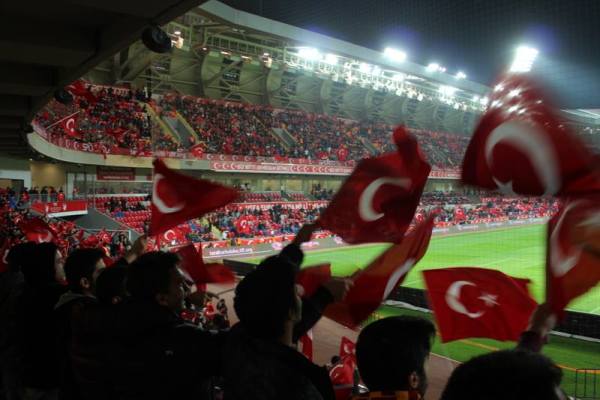Football is a Political Weapon in Turkey (Guest column)
By Patrick Keddie
Turkish football has always been political. When Fuat Hüsnü Kayacan formed the first Turkish-Muslim team – the Black Stockings – in 1901 he was charged in a military court with “setting up goal posts, wearing the same uniforms as Greeks, and kicking balls around.”
The Ottomans had banned Turkish-Muslims from playing the sport as they were suspicious of an activity that was introduced by British expats, and taken up by Armenians, Greeks, and Jews. Some Ottomans believed football violated Islamic codes as the players wore shorts, and some associated the game with the killing of Husayn Ibn Ali, the grandson of the Prophet Mohammed in 680, whose decapitated head was kicked around like a football. Others simply found running after a ball an odd way to behave and worthy of contempt.
Yet, the growing Turkish passion for football could not be repressed. Within the next few years the great Istanbul teams Beşiktaş, Fenerbahçe, and Galatasaray were formed, as political reforms allowed more scope for Turkish-Muslims to play.
The authorities noted the growing popularity of the sport and attempted to harness its power to help build Turkish nationalism.
Over the following decades football attained mass popularity in Turkey. According to some estimates, 76% of Turkish people are now active football supporters. Turkish football fans are known across the world for their intense passion.
Those in power have long favoured and feared football in Turkey because of its mass appeal, and its ability to reach, distract, and galvanise the masses. It is possible to track the evolution of Turkey’s politics, economics, culture, sociology, human geography, and identity through the sport and its relation to power.
While football has always been political in Turkey, it has probably never been more political than it is now – under the ruling Justice and Development Party (AKP), a conservative party with its roots in Islamism, that has been in power since 2002.
The ‘beautiful game’ has become a huge political battleground under the AKP – a significant site of control and rebellion.
The AKP have regulated and reformed football – lavishing unprecedented levels of money and attention on the sport. The AKP’s leading figure – current president Recip Tayyip Erdoğan – talks up his past career as a semi-professional footballer, is eager to associate himself with the building of epic new stadia, and expresses his love for various teams on the campaign trail, while deriding his football-related opponents.
The AKP have used the sport to as a way to shore up and build domestic support, creating a formidable, mutually beneficial network of business and political ties. Football clubs find it necessary to maintain good relations with the government to gain financial support, and governments use football clubs to boost their popularity, while club officials have also used football clubs for political or economic ambitions.
Yet, football is also seen by many in Turkey as a site of rebellion. Fans of different football teams set aside their fierce rivalries to join forces and play a prominent role in the anti-government Gezi Park protests in 2013 and beyond.
Supporters have forged activist movements in which they challenge racism, homophobia, sexism, and express political alternatives to the government, through football.
The authorities have clamped down hard on football fans who are perceived to be against the government; banning political chanting at matches, introducing the controversial Passolig e-ticketing system, forming and supporting pro-government fan groups, and even charging football fans with trying to mount a coup d’etat in the wake of the Gezi protests.
Political factors have contributed to a sense of wider malaise in Turkish football, which is also marred by ballooning debt, corruption, and violence. Some have even suggested that Turkish football could collapse.
In terms of wider politics, Turkey is now at a critical point in its history, with much at stake. The ostensible initial economic and political success of the AKP is giving way to a more fraught situation in which the economy is faltering, the Kurdish peace process has broken down, terrorism is increasing, regional pressures are mounting – including fallout from the war in neighbouring Syria – and the government is becoming increasingly authoritarian.
These changes have been reflected in football. Most recently the increased violence in the southeast of the country was reflected in the tensions and controversy surrounding the Kurdish team Amedspor as they humbled some of Turkey’s biggest clubs during a thrilling and unlikely cup run.
Surprisingly few books have been written in English on Turkish culture and daily life – and Turkish football has been particularly neglected. Yet, football can provide a lens through which to understand this vital, diverse, and complex country.
I am writing a book that will tell the stories of a range of colourful characters and clubs, including ultras in revolt, power-hungry mayors, Kurdish nationalists fighting through football, women asserting their rights to wear shorts and play sports, Islamist moguls, football stars turned politicians, ultranationalists, refugees trying to make a life, great clubs in crisis, gay referees and LGBT teams, and Turkey’s charismatic and controversial ruler: ex-semi-professional footballer and current president Recip Tayip Erdoğan.
The many stories in my book will serve a greater narrative about modern Turkey, which asks: What is the political potential in Turkish football? What will happen to a sport on the brink of collapse? Where is Turkey heading under the ruling AKP? And what does it mean to be Turkish in the 21st century?
Please consider supporting or sharing the crowdfunding campaign for my book.




Comments
Post a Comment